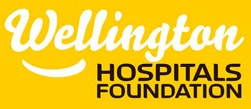
As we celebrate National Volunteer Week, we are very fortunate to have a family of more than 400 volunteers who generously gift their time and talents to support our hospitals every week.
Among them is Bob, a dedicated Guide at Hutt Hospital for the past five years, continuing the legacy of his late wife, Sue, who volunteered for 2.5 years.
Sue, a former hospital school teacher of 28 years, cherished her role, finding great value in being a welcoming presence for people entering the hospital. Though they worked different shifts, Bob also took over Sue’s shifts after her passing in 2022, honouring her memory and dedication to helping others.
Bob, a sixth-generation Wellingtonian, has a rich and diverse background. He earned a Bachelor of Engineering in Structural Engineering and worked at the Lower Hutt City Council for eight years. He then spent 37 years in stained glass restoration, including restoring windows at Parliament. Bob is actively involved with Rotary, Probus, as well as the Take Heart Club, and Hutt Valley Heart Trust.
In 2015, Bob received the Hutt Civic Award for his community service. His involvement with the hospital extends beyond volunteering; he has been instrumental in fundraising efforts and has played the role of Father Christmas in the children’s ward. Additionally, Bob supports children with burns in the plastics unit through camps and holiday activities.
Bob’s inspiration to volunteer at the hospital stems from his gratitude for the life-saving treatment he’s received at both Hutt and Wellington Hospitals since 2016. “They saved my life, and now life is good,” Bob shares, reflecting his desire to give back. “My volunteer work at Hutt Hospital is a tribute to the exceptional care I received.”
Bob believes his volunteer work significantly contributes to the well-being of patients and their families. “A lot of folks are very scared coming into the hospital, and they are very vulnerable. As a volunteer, I like to make them feel welcome, that they have a friend and they don’t have to be alone. On the wards, people are so lonely; some get no visitors for such long periods. As a volunteer, we are there to listen to them and ask questions so they can talk.”
Volunteering has profoundly impacted Bob both personally and professionally. He has made friends within the community and has gained a deeper appreciation of life and the various illnesses people face. Once fearful of hospitals, Bob now feels at home. It has also positively affected his own health. When he started, he could barely walk with a walker, but now, thanks to his guiding duties, he walks well independently and has lost a staggering 30kgs.
Bob’s advice to those considering hospital volunteering is to commit to the role, talk to people without judgement, remain open and calm, and run a good reception desk! “It is a great place to meet people,” he adds.
Bob recalls a particularly fulfilling moment during the nurse’s strike when he spent half a day talking to a woman who had been alone with no visitors. “She just wanted someone to listen to her. She was such a different person afterwards,” he remembers, highlighting the profound impact a volunteer can have on someone’s life.
Volunteers at Hutt Hospital play a crucial role in supporting both patients and their families. Nicole Barker, who manages the team told us, “Hutt Hospital has a wonderful mix of experienced and new volunteers. The seasoned volunteers take their coaching roles seriously, helping newcomers acclimate and thrive. This mentorship ensures a high standard of service and fosters a sense of ownership and pride among the volunteers, creating a welcoming environment for everyone who walks through the hospital doors.”
Tina Ririnui, Director Clinical Support Services for Hutt Hospital, adds, “Our volunteers provide an invaluable service, offering comfort and support to those in need. Their dedication and compassion significantly enhance the patient experience.”
Our grateful thanks to all our incredible volunteers. They make such a positive difference in the lives of patients, their families, and hospital staff, and help build a strong sense of community and well-being within the hospital environment.
He aha te mea nui o te Ao? He tangata, he tangata, he tangata. What is the most important thing in the world? It is the people, it is the people, it is the people.
